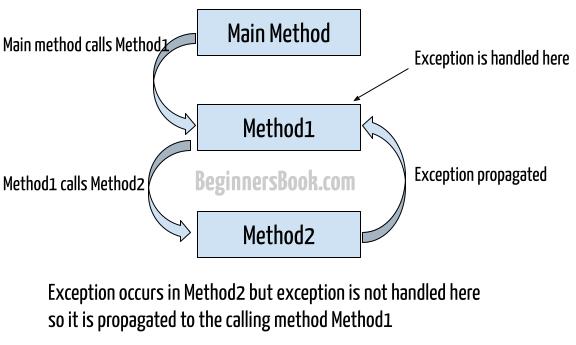
Exception propagation is a process by which compiler ensures that the exception is handled somewhere, if it is not handled where the exception occurs. For example, if main() method calls a method and that method (method1) is calling another method (method2). If the exception occurs in method2 and is not handled there then the exception is propagated to calling method method1 to see if it is handled there.
Exception Propagation Program in Java
This program demonstrates how the exception propagation happens in Java. Here, in the main method, we are calling a method to print the quotient value after dividing an integer num1 by num2.
The printQuotient() method internally calling another method calculateQuotient() to calculate the quotient value.
Since the value of variable num2 is 0 the exception occurs where the division actually happens, in this case, it happens in the calculateQuotient() method.
However there is no exception handling in calculateQuotient() method, so the exception is automatically propagated to the calling method printQuotient(), where the exception is handled.
public class JavaExample {
//exception occurred in this method but it is not handled here
//so the exception is propagated to the calling method printQuotient
int calculateQuotient(int num1, int num2) {
int temp = num1/num2;
return temp;
}
//Here we have done exception handling
void printQuotient(int num1, int num2){
try {
int q = calculateQuotient(num1, num2);
System.out.println("Quotient is: " + q);
}catch(ArithmeticException e){
System.out.println("Arithmetic exception occurred");
}
}
public static void main(String[] args) {
int num1 = 10, num2 = 0;
//calling method
JavaExample obj = new JavaExample();
obj.printQuotient(num1, num2);
}
}
Output:
Arithmetic exception occurred
How can we use this feature to improve the code?
In any java application, there are multiple scenarios where a method calls second method and the second method calls third method. As we have seen that how exceptions are propagated in the hierarchy of method calling, so you only need do exception handling in the first method, this saves the exception handling part in second and third method.
You do not need to write addition code in second and third methods, this saves time, shorten the lines of code and improves the readability of the code.
Note: This doesn’t mean that the exception handling cannot be done in the methods down in the method calling chain, it can be done there, but doing so will make code look cluttered. Also, it will make the code harder to troubleshoot in case of any issue arises.
Exception propagation in checked and unchecked exceptions
Does exception propagation happens in both checked and unchecked exceptions? No, exception propagation only happens in unchecked exceptions and not in checked exceptions. The reason is pretty simple, the checked exceptions required to be handled during compile time else the compiler will throw compilation error.
This program throws compilation error because the exception is not handled in myMethod3().
class JavaExample{
void myMethod3(){
throw new java.io.IOException("Checked Exception");
}
void myMethod2(){
myMethod3();
}
void myMethod(){
try{
myMethod2();
}catch(Exception e){
System.out.println("Exception occurred: "+e);
}
}
public static void main(String args[]){
JavaExample obj=new JavaExample();
obj.myMethod();
System.out.println("normal flow");
}
}
Output:
Error:(3, 5) java: unreported exception java.io.IOException; must be caught or declared to be thrown